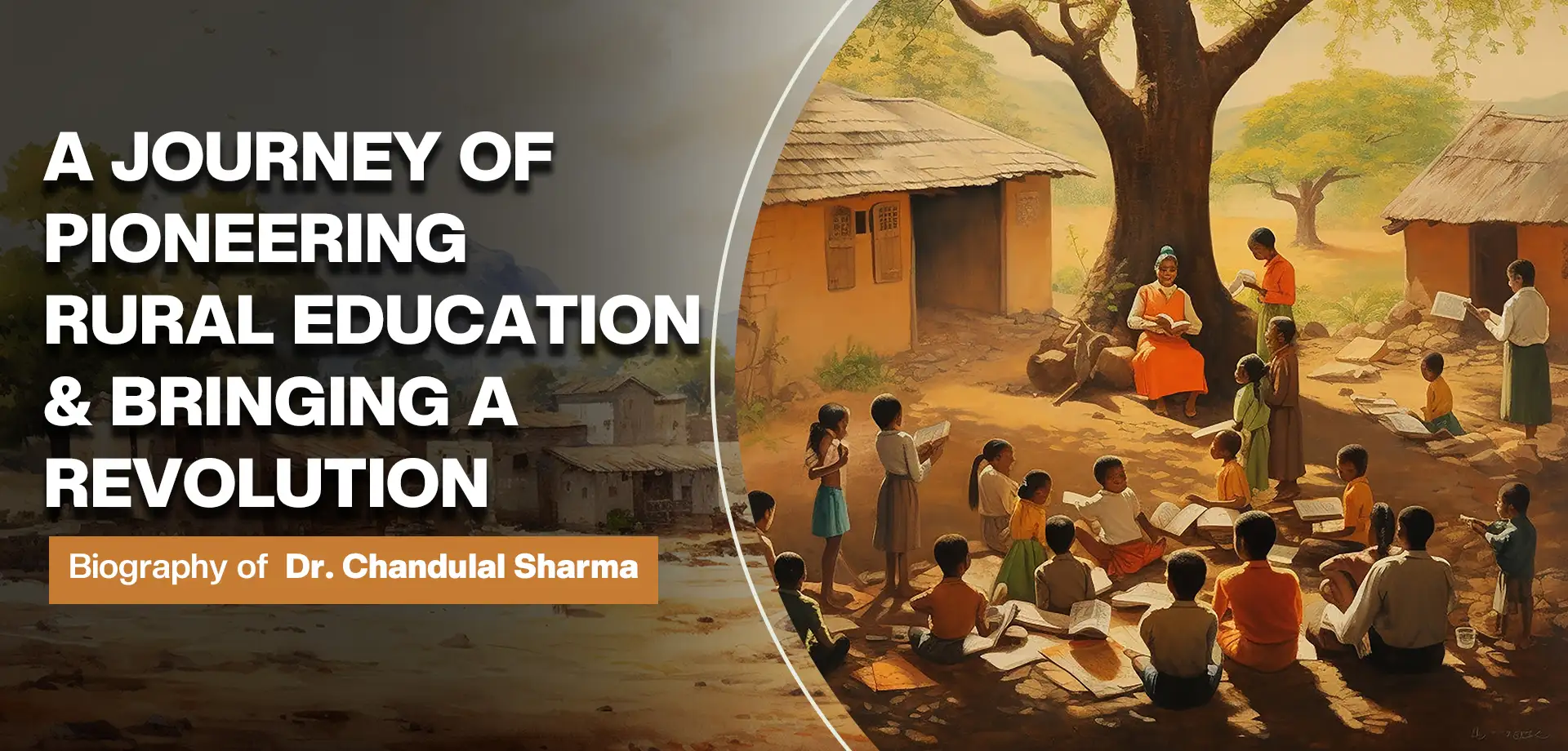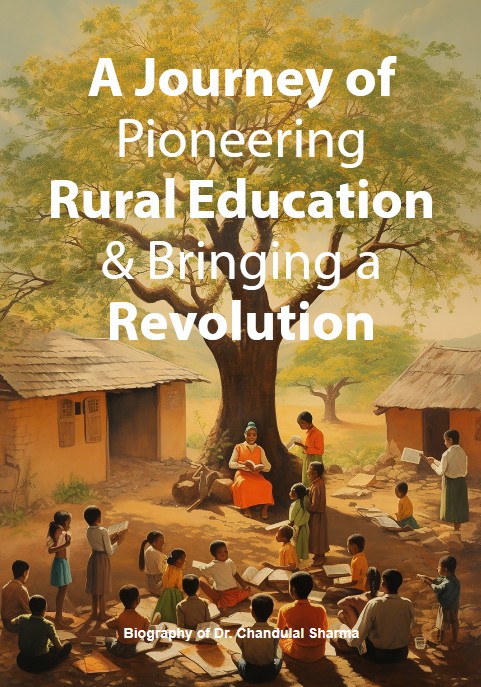

The two most important days in your life are the day you’re born and the day you find out why."
Dedication
This biography is first and foremost dedicated to the pillars of my life—my beloved parents, Late Smt. Vimala Devi and Late Shri Moolchand Sharma. To my mother, your strength and grace as a homemaker and the quiet anchor of our family have shaped my values and my character. Your nurturing spirit taught me the importance of love, discipline, and resilience. To my father, your vision of education as the key to progress, your relentless work as a teacher and farmer, and your role as a village leader are the foundations upon which I stand today. You believed in the power of knowledge, and it is that belief that has guided my every step.
To my grandfather, Shivchandra Rai Sharma, whose commitment to social justice and his fearless stand against the evils in society inspired me to pursue a life of service. Your selfless dedication to the welfare of the community and your steadfast values continue to illuminate my path. Your legacy lives on in every effort I make to uplift others and uphold righteousness.
To my wife and children—thank you for being my unwavering support system. To my dear wife, your love, understanding, and sacrifices have been my strength. Your faith in me, your ability to balance home and the many challenges that come with it, has been my pillar of stability. Together, we have navigated the highs and lows of this journey, and for that, I am eternally grateful. To my children, you are the living proof of all I have worked for. I hope you carry the torch of knowledge and values forward, and live lives of integrity and purpose.
To the community, friends, colleagues, and trustees who have shared in this mission, your belief and partnership have made all the difference. This journey has not been mine alone. It is a collective endeavor, one that has touched the hearts of many, and together, we have made a meaningful difference in the lives of countless individuals.
And finally, to every student—especially the young girls and underprivileged children—who have walked through the doors of our institutions, this story is for you. May it inspire you to pursue your dreams with determination, to challenge every obstacle, and to never underestimate the power of education. Let this be a reminder that no dream is too big, and no person is ever too small to make a difference.
Dr. Chandulal Sharma
Phase 1 : Roots of Grace in the Sands of Rajasthan
“Nothing ever goes away until it teaches us what we need to know.”
Dr. Chandulal Sharma was born in Jhunjhunu district of Rajasthan in a small village of Hansalsar, where dry winds sweep across its golden terrain. Dr. Chandulal Sharma started his life story within the cultural and traditional setting of rural India at this place. Dr. Chandulal Sharma developed his life according to the values of integrity and service, which ran deep through his ancestors, who sacrificed their efforts to advance community welfare and promote education.
His mother, Smt. Vimala Devi was a housewife through her wise words and gentle advices, which kept the family connected and functioning well. Her significant impact on her children included imprinting upon them discipline alongside kindness and purpose. Late Shri Moolchand Sharma, his father lived as both an educator and a farmer since his roles deeply revealed his essential personality traits. In addition to his agricultural work under daylight, he presented lessons during initial hours from his chalkboard to spread information combined with life lessons. Following retirement, he directed his energies toward serving as Sarpanch of Hansalsar while working to change the village. During his leadership period, roads appeared, institutions restarted functioning, and the community halls became lively with new activities.
Mr. Moolchand Sharma started a legacy that developed from previous roots from his Shivchandra Rai Sharma who was the grandfather of Dr. Chandulal Sharma. Villagers held his leadership in high esteem because he served as head of social organizations while safeguarding animals and conducting effective control of communal pastures. He protected society from all forms of social evils because he possessed an indomitable love for justice that burned throughout his entire being. The remarkable force of his grandfather, Shivchandra Rai inspired the township people to support him with every honorable project he pursued.
The values of service alongside self-discipline and knowledge surrounded Dr. Chandulal Sharma from his childhood in this environment. He had 4 brothers who experienced both family customs and India’s rural development during his youth. He spent his early years involved in basic rural activities since his environment lacked modern entertainment systems or material comforts. His first school, as well as his introduction to outside experiences, took place at this simple government institution.
His formal schooling at that local educational facility brought the beginning of academic learning, yet he received his true boarding from observing his family members demonstrate their diverse life lessons. His natural inclination for curiosity and self-discipline drove Dr. Chandulal Sharma to study at educational institutions, which he would in the future restore and operate. His cycle of acquisition of academic degrees brought him more than official qualifications because it forged his deep admiration for basic national education.
Phase 2 : From Chalk Dust to Campus Dreams
“We can see through others only when we can see through ourselves.”
As sunrise hit the new millennium, Dr. Chandulal Sharma made the decision that would shape the rest of his life. Dr. Chandulal Sharma faced his first major life choice after earning both his postgraduate degrees in history from the University of Rajasthan, followed by education from IASE University in Sardarshahar. Aside from public service opportunities, he could have accepted employment with an established organization in an urban area. But instead, he looked homeward. The dusty blackboards paired with the classrooms from his rural childhood village drew him back into service to support the dreams of the youth who often had their ambitions crushed before maturation. He made his life’s purpose clear when he chose education for social transformation together with social improvements starting back at his original education location.
Before designing his future work, he dedicated time to refine his professional tools. He traveled to Mysore in Karnataka for his B.Ed. as he researched the local educational system, which differed from the educational system in Rajasthan. During this period he learned both pedagogical concepts and innovative student psychology approaches and institutional administration methods. After his academic achievement, he brought back more than a degree because he had now gained purpose.
With help of a small group of friends, Dr. Chandulal Sharma established a school located in Hansalsar. Everything began with minimum facilities while only a small group of students attended. But its purpose was mighty. The learning curriculum extended beyond basic subjects because Dr. Chandulal Sharma wanted rural children to develop ambitious dreams. Students at his educational institution gained academic excellence alongside strong discipline and ethical teachings that filled all classrooms. As word spread, enrollment grew. Parents who earlier avoided school enrollment of their children, particularly their daughters, began to examine the educational institution as a trustworthy method to plan their families’ future.
Dr. Chandulal Sharma had a goal that reached past his single institution to touch every educational institution that mattered to him. During 2007 he initiated the staggering project to reopen schools that had shut down before India gained independence. He received backing from the Shivdut Rai Education Society together with other members of a devoted trust family to revive these educational structures a room at a time.
His method brought innovative changes to the system while staying rooted in reality. He brought modern education standards to curriculum instruction and assessment yet maintained the core values of integrity, service, and cultural pride. Through his innovations, he put into practice programs that increased both student participation and success rates. He directed the budget management operations exactly while selecting qualified educators and executing graduated upgrades to the facilities. Through his management, the abandoned compounds transformed into active learning institutions.
His commitment to female education marked the most significant transformation in his academic development. Dr. Chandulal Sharma made the decision to fight conventional rules by establishing educational opportunities for girls beyond primary school education in this region of restrictive social practices. He established a college inside the village to deliver education and a teacher-training college mainly for female students. Nine out of ten students at the educational institution were female since most girls typically could not receive advanced education outside their immediate area.
Phase 3 : Pillars of Change and the Power of Trust
“If there is no struggle, there is no progress.”
The dusty paths of Baragaon began to bustle with fresh energy. It wasn’t just the hum of construction or the chatter of students that filled the air—it was the quiet roar of transformation. At the heart of it stood Dr. Chandulal Sharma, who by now had become more than an educator. He was a visionary, a community leader, and a bridge between the past and the future. His work with the Shivdut Rai Education Society and Smt. Gomati Devi College Education Group had already started changing the face of rural education, but he was just getting started.
In 2007, when he officially took charge as Director of the Shivdut Rai Education Society, it marked the beginning of a new era. This wasn’t just an administrative role. It was a personal calling. Under his leadership, institutions didn’t just function—they flourished. He brought a sense of professionalism to rural education management that was rare and commendable. With a firm belief in systems and strategic planning, he created roadmaps for development, carefully balancing financial sustainability with inclusivity.
One of his major achievements was developing and implementing educational programs that dramatically increased student engagement and academic results. Each initiative was deeply rooted in the local needs of students from Jhunjhunu and surrounding villages. He made sure every student had access to quality education, whether they came from a family of farmers, artisans, or daily-wage workers.
Dr. Chandulal Sharma introduced regular faculty training, helping teachers adapt to evolving pedagogical methods. District-wide professional development sessions, many led by him personally, became a hallmark of his leadership. His focus on aligning the curriculum and assessments with both state standards and future job market requirements gave students a distinct advantage. He knew that knowledge without direction was wasted, so he shaped institutions where both academic intelligence and life skills were nurtured equally.
He didn’t work alone—he worked with trust. His credibility, earned through years of consistent service and transparent leadership, made people believe in his cause. Trustees and philanthropists not only offered their support but often let him take the reins completely. They had seen his results, felt his sincerity, and trusted his vision. Large sums of money were invested into the institutions under his guidance—not for vanity projects, but for libraries, laboratories, scholarships, and school infrastructure. Every rupee spent could be seen reflected in the smile of a newly admitted student or the confidence of a girl entering a college classroom for the first time.
And he didn’t stop at education alone. Through the trust, he actively reached out to the needy—offering food, clothing, healthcare support, and even financial help for marriages of underprivileged girls. He became known not just as an educator but as a philanthropist whose help always came without delay or hesitation. His connection to the people was not transactional—it was emotional, rooted in compassion and empathy.